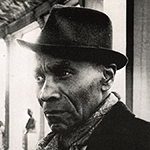I Know Nothing Indeed
I KNOW NOTHING INDEED
nothing more sad
more hateful
more frightful
more tearful in the world
than hearing love
throughout the day
repeated like Low Mass
It happened once
a woman came
a woman came to pass
whose arms were heavy with roses
Always You’ll Come
Always you’ll come
as you came
even though
I am
at the other end of the World
always you’ll come
as you came
to chase off the fever
of my burning forehead
with your hands
that flourish with jasmine
but how often clammy
with fright
……………………………………………………
Even though I am at the other end of the World
always you’ll come
across the line
There Is No Noon That Stays
THERE IS NO NOON THAT STAYS
and since it’s no longer twenty years old
my heart
nor the hard tooth
of the little old man
no noon that stays
I will open it
no noon that stays
I will open it
no noon that stays
I will open
no noon that stays
I will open the window
no noon that stays
I will open the window to the spring
no noon that stays
I will open the window to the spring that I will eternal
no noon that stays
Through the Window Half-Opened
THROUGH THE WINDOW HALF-OPENED
on my disdain for the world
a breeze rose
perfumed by stephanotis
while you drew to YOURSELF
the whole curtain
As
I see you
I will always re-see you
drawing to yourself
the poem’s whole curtain
where
God how beautiful you are
but slow to be nude
Hiccup
And although I’ve swallowed seven gulps of water
three to four times every twenty-four hours
my childhood returns to me
in a shuddering hiccup
my instinct
like the fuzz the thug
Disaster
speak to me of disaster
speak to me of it
My mother wanting from a son very good table manners
Hands on the table
bread is not cut
bread is broken
bread is not wasted
bread of God
bread of the sweat of your Father’s brow
bread of bread
A bone is eaten with measure and discretion
a stomach ought to be sociable
and every sociable stomach
lets out burps
a fork is not a tooth-pick
no blowing your nose
so it’s known
so it’s seen by all the world
and then you have rightly
a well-raised nose
don’t wipe off the seat
And then and then
and then in the name of the Father
of the Son
of the Holy Spirit
at the end of each meal
And then and then
and then disaster
speak to me of disaster
speak to me of it
My mother wanting from a son a reminder
If you don’t know your history lesson
you shall not go to Mass
Sunday
with your Sunday things
This child will be the shame of our name
this child will be our name of God
Be quiet
I’ve told you or not that you have to speak French
the French of France
the French of French
the French French
Disaster
speak to me of disaster
speak to me of it
My Mother wanting from a son
son of his mother
You didn’t greet the neighbor
already your shoes are filthy
and so I rebuke you there in the street
on the grass or the Savannah
in the shadow of the Monument to the Dead
while you play
while you frolic with So-and-so
with So-and-so who isn’t baptized
Disaster
speak to me of disaster
speak to me of it
My Mother wanting from a son much do
much re
much mi
much fa
much sol
much la
much ti
much do
re-mi-fa
sol-la-ti
do
It came back to me that you didn’t go yet
to your vi-o-lin lesson
A banjo
you tell me a banjo
how do you say
a banjo
you really say
a banjo
No sir
you know we don’t allow those in our house
no ban
no jo
no gui
no tar
the mulattos don’t do that
so leave that to the negros
Translator’s Note:
Damas was one of the key figures of the négritude (“blackness”) movement, alongside the Martiniquais poet Aimé Césaire (1913-2008) and the Senegalese poet and president Léopold Ségar Senghor (1906-2001). (The Malagasy poet Jean-Joseph Rabearivelo (1901-1937) could be considered one of their forerunners.) Négritude was a movement by French-speaking African authors to focus on the Black experience. Sometimes this involved drawing on the cultural heritage of their own countries (as Senghor did, in particular); sometimes it involved delving into the “colonized personality” (in Frantz Fanon’s phrase) of Africans and the African diaspora; sometimes it involved recounting their contemporary experience.
Though the movement was present in prose, its greatest power was in its poetry. (Thus Sartre’s essay on the movement was entitled “Black Orpheus.”) Damas’ poetry was metrically irregular and inspired by jazz, and it made use of everyday language (a contrast to Césaire’s frequent Surrealism). His first collection, Pigments (1937), was so sharp in its discussion of the black experience that it was banned by France as a “threat to the security of the state.” The poem “Hiccup” comes from Pigments; the remaining poems translated here come from his later collection Névralgies (Neuralgias) (1966). Both are published by Présence Africaine, the publishing arm of a journal of the same name, for which Damas served as a contributing editor.
In my translations, I have replicated Damas’ line breaks and his indentation (particularly in “Hiccup”), as well as his practice of sometimes including the title, italicized, as the first line of his poems. I hope I have captured something of his style, though my aim here has been faithfulness to the words rather than to the rhythm.

Léon-Gontran Damas (1912-1978) was born in Cayenne, French Guiana. After initial studies in Martinique, he moved to Paris to study law, where he began to write essays and poems. During World War II, he served in the French Army and took an active part in the French Resistance. After the War, he continued his literary and political work, serving as the Guianese delegate to the French National Assembly and as a UNESCO delegate for the Society of African Culture. He spent his final years teaching at Howard University in Washington, D.C., where he died.

B.P. Otto is a translator, poet, author, and homemaker; his original poetry has appeared in The Lyric, and his translations of poems by Jean-Joseph Rabearivelo appeared in a previous issue of ANMLY.

 BACK TO ISSUE
BACK TO ISSUE